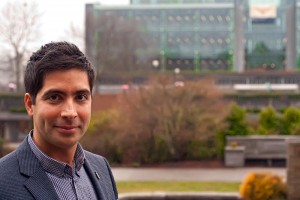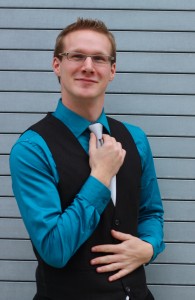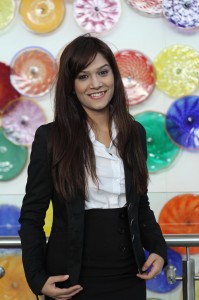The 21-member Board of Governors at UBC is composed of “the Chancellor, the President, eleven persons appointed by the Lieutenant Governor in Council (representing the province), three students elected by students, three faculty members elected by faculty, and two employees elected by employees.” Two of these students are elected during AMS Elections from the student population at UBC Vancouver. (the third student is from UBC Okanagan).
These elected representatives are privy to a vast amount of information about UBC, as essentially every major decision is passed by the Board. They also have a unique opportunity to speak before the Board about student issues, and ensure that major developments at UBC are not negatively impacting quality of education or the student experience.
As two of the 21 members of the Board, it is often argued that the student representatives have effectively no power around the table. While it’s been suggested by both student and non-student board members alike that the student reps are listened to with particular attentiveness, as long as the majority of the members are appointed by the province, that perception won’t be dispelled anytime soon.
If there was a single issue that occupied the board’s time last year, it was the Land Use Plan revisions. The board, years ago, made a strategic decision that the next step in UBC’s evolution would be to turn the university into a university town. The Land Use Plan revisions were framed as necessary to keep that vision moving forward. We asked the candidates the same thing we asked the VP Academic candidates: was Gage South’s designation as an “Area Under Review” a “win for students”, as president Toope has portrayed.
What made the process unnecessarily contentious was the board’s inability to explain the reasoning for the changes except as part of broad, aspirational ideals. It’s condescending that after using housing choice and affordability as one of the main motivators for why the LUP changes were being made, the board then commissioned a report to figure out how to accomplish housing choice and affordability. While SuperSexySass’s contribution to the race has been one-dimensional and almost uniformly disliked, his point about board members adopting the moulds of philosopher kings is on target. Even Nassif Ghoussoub, a faculty rep on board whose is quite candid, portrays the power structure at UBC as a closed loop between the small number of governors and executives with an often docile board.
Nevertheless, improved communication with the public, oft-promised, is starting to be delivered in baby steps. It’s up to individual members like Sean Heisler starting the @UBCBog Twitter account and always being available to students, or Nassif Ghoussoub to do it themselves. On the communication note, we asked the candidates why the board holds all of its serious discussions in private sessions and what can be done about it.
This is not an easy job. Yes, the Board only meets a few times a year. To the layperson this might seem like BoG rep is an extraordinarily simplistic and laid-back position. While there may be some quieter periods, if the position is done correctly, it will not be easy. As mentioned above, the issues the Board tackles are incredibly complex and often rely on a large amount of background information. Student reps must be willing to put in the (often hours of) time necessary to fully understand the implications of every motion. Communication should happen both at the table, during meetings, as well as in the weeks before-hand after the docket is available.
Board is also not a soapbox, or a place to voice particularly controversial topics. Like it or not, if we want the people we elect to this position to be effective, they must be able to work effectively with the rest of the members. This means that they may have to take a more neutral position than they might personally feel is applicable, but in doing this they are more likely to effect *some* positive change, than if they were to argue voraciously for the opposite viewpoint.
In short, an effective BoG rep will be: a good communicator; a “moderate” in terms of how they tackle issues; very knowledgeable about UBC and its inner workings; well-liked by both the University Administration and the student body.
Candidate Profiles

Name: AJ Hajian
Age: 27
Year: 4th
Faculty and program: Science, Computer Science + Economics
Years on campus: 4
Past campus involvement: Current Senator, UBC Annual Technical Career Fair, MUG Leader, Senior Peer Program, Various CS Committees
Past non-campus involvement: Vancouver Board of Trade, Immigration Services Society of BC, Vancouver 2010, G8/G20 Youth Summit
1) Regarding Gage South’s designation as “Area Under Review”, President Toope said in the Ubyssey “I think this was a big win for students…instead of Gage South being designated as it was previously, it’s instead being pulled off the table. (…) So, I actually think it’s a win, and people should take wins when they get them.” Do you agree with the president’s assessment?
Having an up to date consultation with the students and knowing their interests and preferences will give the board the benefit of acting accordingly.
2) In 50 words or less: should UBC be its own municipality?
The combination of UBC being its own municipality and UBC’s high credit rating, this move will give UBC a better financial freedom.
3) Most serious discussions of the board take place in closed sessions. As a result, the reasoning behind board decisions are rarely communicated publicly, exacerbating the public’s view that the board is unaccountable. How can this be addressed? How will you convince others?
Although I am standing behind the accountability of the board and will push for an open and direct communications between the board and the students, sometimes students have to trust with the loud voice of their representations in the board for some key decisions for an effective result.
 Name: Sean Heisler
Name: Sean Heisler
Age: 21
Year: 3.5th
Faculty and program: Integrated Engineering, Minor in Commerce
Years on campus: 3
Past campus involvement: Board of Governor’s Rep, Applied Science Student Senator, Member of the Public Hearing Panel,…
1) Regarding Gage South’s designation as “Area Under Review”, President Toope said in the Ubyssey “I think this was a big win for students…instead of Gage South being designated as it was previously, it’s instead being pulled off the table. (…) So, I actually think it’s a win, and people should take wins when they get them.” Do you agree with the president’s assessment?
I think where the difference between President Toope’s statement, and the views of most of the students involved (myself included) comes from is a difference in scale. The fact of the matter is that taking an area which was completely assigned market housing, and turning it into an Area Under Review with additional commitments as to what types of housing will be allowed there, is actually a significant victory. Especially when considering that it happened against the initial wishes of those running the consultations – but just because it is a win doesn’t mean the war is over. Gage South is not completed, there will be another round of consultations happening in the spring, and the war will continue, and maybe we can reclaim that piece of land, a student heart of campus, back to an Academic zoning. So Area Under Review wasn’t the decisive war ending victory that many were hoping for, but it is still a victory.
2) In 50 words or less: should UBC be its own municipality?
No. At least not in the simplicity expressed in this question. UBC, as it stands now, is not at all prepared to become its own municipality, and there is an innate conflict of interest, and issue of priorities, that is latent in that question. UBC should be first and foremost concerned with the Academic Mission, and as an arm of that Place and Promise. This isn’t what a municipality should be chiefly concerned about though, accountable representation and the interests of the constituents. With massive changes in organization and structure, it is possibly conceivable that UBC could do both, but not the UBC we are currently familiar with – and those massive changes can’t happen in this short of a timeline.
3) Most serious discussions of the board take place in closed sessions. As a result, the reasoning behind board decisions are rarely communicated publicly, exacerbating the public’s view that the board is unaccountable. How can this be addressed? How will you convince others?
The Board is perpetually stuck in this situation, and its definitely a difficult one. A lot of discussions need to be in closed, especially when they deal with sensitive issues hitting politics or business negotiations. That being said, a lot of the content of a closed discussion doesn’t need to be closed, and a large majority of the frustrations and questions students have can be alleviated with Board member face time. This year was one of the first joint mixers that was hosted with Board members and student leaders, and the reaction from the Board members who were present was immensely positive. Riding this success, Azim and I have been advocating through the Governance Committee to establish a communication focus group with external Board members and key student, faculty and staff communicators to help determine what messages need to be better projected.
Name: SuperSexySass Sangsari
Age: 123
Year: 2nd year of my ninth Ph.D.
Faculty and program: Fecal Sciences
Years on campus: 4
Past campus involvement: Trying to open a strip club at the village
Past non-campus involvement: Strip club owner
1) Regarding Gage South’s designation as “Area Under Review”, President Toope said in the Ubyssey “I think this was a big win for students…instead of Gage South being designated as it was previously, it’s instead being pulled off the table. (…) So, I actually think it’s a win, and people should take wins when they get them.” Do you agree with the president’s assessment?
As a rule of thumb, Toope knows his shit. Also, the fact that it’s under review again gives me the chance to voice student concerns as BoG next year as the issue continues to be debated.
2) In 50 words or less: should UBC be its own municipality?
UBC should become autonomous. Quebec half-assed it, but we can do it!
3) Most serious discussions of the board take place in closed sessions. As a result, the reasoning behind board decisions are rarely communicated publicly, exacerbating the public’s view that the board is unaccountable. How can this be addressed? How will you convince others?
As you may have noticed, I don’t have a filter. If anything unethical or unjust is passed in closed sessions I’ll just blurb it out to the public.
Name: Sumedha Sharma
Age: 21
Year: 4
Faculty and program: Science, Integrated Science: Microbiology and Physiology
Years on campus: 4
Past campus involvement:
SUS:President 2010-2011
Member of the working committee for Dean of Science’s Strategic plan for students
VP External 2009-2010: Chair of Science Frosh 2009, Science Grad 2010 and Science Week 2010
committees
Social Coordinator 2008-2009
Social Coordinator for Science Frosh 2008 and Science Grad at Science World (2009)
UBC Orientations: Imagine Day Science Squad Leader 2009-2010
GALA International Student Orientation Squad Leader 2008-2009
VPS Emerging Leaders Program: Science POD leader 2008-2010
Emerging leader and UBC Reading Week Volunteer 2007-2008
AMS Speakeasy: Volunteer 2007-2009
Past non-campus involvement:
Peer Volunteer and Volunteer Mentor at Canuck Place Kids Hospice: 2006-Present
Emergency Triage Volunteer at Royal Columbian Hospital; 2006-2008
Auxiliary ward volunteer, Queens Park Care Center 2006-2008
Spearhead awareness campaigns to inform public about Human Trafficking in Canada
1) Regarding Gage South’s designation as “Area Under Review”, President Toope said in the Ubyssey “I think this was a big win for students…instead of Gage South being designated as it was previously, it’s instead being pulled off the table. (…) So, I actually think it’s a win, and people should take wins when they get them.” Do you agree with the president’s assessment?
I believe that the AMS and the previous board members have gained substantial momentum in lobbying
to keep the Gage South area and they should celebrate the credit for this. It is a big step forward but
we are not there yet so we should be cautious when claiming this as a win. We are still far behind in
encouraging a more and clear dialogue around the Gage South “Area Under Review” and on issues such
as how we intend on having an area that is conducive and supportive of student life at UBC.
In 50 words or less: should UBC be its own municipality?
If UBC becomes its own municipality, we may face a situation where there could be potential situations where conflicts of interest could arise. UBC is an academic institution and that should be its priorities. For these reasons I feel that UBC should not be its own municipality.
3) Most serious discussions of the board take place in closed sessions. As a result, the reasoning behind board decisions are rarely communicated publicly, exacerbating the public’s view that the board is unaccountable. How can this be addressed? How will you convince others?
This issue has been correctly identified as being one of the main reasons on why Board is deemed unaccountable. However, increasing accountability goes hand in hand with increased communication. It is essential that we do discuss things and engage students in consultations regarding things that the Board reps are privy to talk about. Engaging student via blog posts could go a long way. Furthermore, working with the AMS, constituencies and clubs to drive these consultations would be the first step to bridging the gap between students and the board.







Discussion
Comments are disallowed for this post.
Comments are closed.